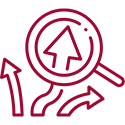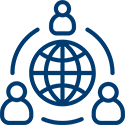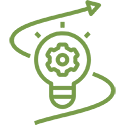The NERCOMP Annual Conference plays a pivotal role in bringing together a community of higher education IT and library professionals to build expertise and share information on the latest issues in the field. This conference is the place to connect with peers, share successes (and struggles), and enhance our collective learning.
Program Tracks
The rapid pace of innovation in technology offers exciting opportunities for education professionals, but it also brings with it a corresponding need for flexible support services and delivery processes to keep up with the challenge of constant change. Whether your institution is evaluating and implementing new technologies and support practices or has successfully updated your IT service operation's technologies and procedures, this track invites you to share your strategies for providing effective and efficient IT support services and solutions to diverse and ever-changing faculty, students, and administrators with uniformly high expectations. Discussions about social good, including diversity, equity and inclusion, within the context of AV and IT service provision are highly encouraged.
One of the most talked-about areas of technology—and perhaps one of the least understood—is that of data-driven decision-making. Promises of transforming our institutions and the lives of our students through the collection and analysis of data now seem plausible and within reach, but many of us need to learn a lot more about how to actually do it. If your institution has been successful in developing and using dashboards, predictive modeling, reporting and analytics, and business intelligence, this track is the place to share those experiences, processes, and insights that can help faculty and administrators in measurable ways. Discussions about social good (including diversity, equity, and inclusion) within the context of data, learning analytics, predictive modeling, and decision tools are highly encouraged.
The world that today's college students live in is overwhelmingly digital (and increasingly mobile) and offers a wealth of opportunities that have only begun to be tapped by our institutions. With the potential to transform everything from recruitment and retention to academic success and alumni engagement, these constantly evolving digital technologies may provide the key to a new and more closely connected student/school relationship. This track encourages submissions that share current and completed projects, as well as visions for how the personalized world of today's technology can bring new opportunities to our students and our institutions. Discussions about social good (including diversity, equity, and inclusion) within the context of student success practices, initiatives and innovations is highly encouraged.
Effective leadership takes place at all levels of an organization. We are continually asked to respond to changing client expectations, resource constraints, increasing calls for accountability, and proliferating technology alternatives. This track seeks to showcase strategies, both successful and not so successful, that create a shared sense of mission and allow all members of a team to contribute their ideas. Discussions about social good (including diversity, equity, and inclusion) within the context of leadership, team-building/high performing teams, and organizational growth and development are highly encouraged.
As libraries seek to redefine themselves in the 21st century, branching out into content creation, makerspace management, and new partnerships around teaching, learning, and scholarship, the opportunities—and questions—for how libraries will lead the Information Age can seem overwhelming. What collaborative partnerships, decisions, and technologies should librarians take advantage of in scholarship and research? What strategic innovations can libraries share to help establish a new model of relevance in colleges and universities? And given the continual pressure to justify budget requests and resource allocations, how can we define and establish new organizational structures and services? This track encourages the sharing of provocative ideas, ongoing projects and plans, and early-stage successes that can help our community begin to answer these provocative questions. Discussions about social good (including diversity, equity, and inclusion) within the context of library operations, technologies, services and spaces are highly encouraged.
Protecting critical data and services in a culture that puts a high value on openness and accessibility presents special challenges. With increasing numbers moving to "the cloud" and increasing data available on mobile devices, how institutions deal with protecting data that is outside the control of central IT is a monumental challenge faced by every institution, no matter its size or focus. How campuses deal with issues such as the appeal and value of sites such Facebook and Twitter; the growing legal complexities surrounding data protection and personal privacy; and the consumerization of IT and the spiraling use of personal devices for work purposes are of increasing importance to IT managers and academic administrators. This track seeks to highlight the role that campus policies and regulations—along with the growing technical challenges of securing devices and data—play in our institutions' daily work, and it seeks to allow institutions to share their thorniest problems, brainstorm some attainable goals, and present examples of policy approaches and accomplishments. Discussions about social good (including diversity, equity, and inclusion) within the context of policy, regulation, and security are highly encouraged.
No matter the size or scale of the institution, user expectations are always high, and systems are always assumed to be running efficiently and without any glitches. Keeping systems stable and agile, secure yet accessible, feature-rich but easy-to-use, is a challenging and complex task. How does an IT department implement best practices, provide cutting-edge innovation, and remain cost effective—all at the same time? This track seeks to showcase examples and ideas from a wide range of institutions that can help us understand some of the creative and nontraditional solutions to both age-old and new problems in enterprise computing. Whether it's keeping up with the instantaneous tech expectations of our students, the work-from-everywhere needs of our faculty, administrators, and staff, or the dashboard-and-data demands of our top-level executives, come and share your stories of experiences and challenges for the benefit of the community. Discussions about social good (including diversity, equity, and inclusion) within the context of systems and solutions are highly encouraged.
The changes that have taken place in teaching and learning over the past 10 years have been dramatic, and technology has been a motivating force behind many of them. From active and project-based learning to increasingly sophisticated means for engaging students online, the nature of higher education pedagogy has undergone a true transformation. The richness of these new approaches, methodologies, and techniques is the focus of this track, which seeks to demonstrate the innovation and creativity that so many professors, instructional designers, and tech support professionals are bringing to their classrooms (both physical and virtual). All manner of teaching and learning stories are welcome, as we share in each other's triumphs and the "back to the drawing board" moments.
Conference Highlights

Premium programming on the latest trends in higher ed IT from experts and community peers

Numerous networking opportunities for meaningful connections

Access to innovative technology and solutions providers
General Session Presenter

Karen Catlin
Author, Better Allies: Everyday Actions to Create Inclusive, Engaging Workplaces
Schedule At-a-Glance
|
Monday March 27 1:00 p.m.–5:00 p.m. ET |
|
|---|---|
| 1:00 p.m.–3:00 p.m. | Sessions |
| 3:00 p.m.–3:30 p.m. | Refreshment Break |
| 3:30 p.m.–5:00 p.m. | Sessions |
|
Tuesday March 28 7:00 a.m.–6:00 p.m. ET |
|
|---|---|
| 7:00 a.m.–5:15 p.m. | Registration |
| 8:30 a.m.–9:15 a.m. | Sessions |
| 9:30 a.m.–10:45 a.m. | General Session |
| 10:45 a.m.–12:00 p.m. | Exhibit Hall |
| 12:15 p.m.–1:15 p.m. | Lunch |
| 1:15 p.m.–3:45 p.m. | Exhibit Hall |
| 4:00 p.m.–4:45 p.m. | Sessions |
| 4:45 p.m.–6:00 p.m. | Reception & Exhibit Hall |
|
Wednesday March 29 8:30 a.m.–3:45 p.m. ET |
|
|---|---|
| 8:30 a.m.–9:15 a.m. | Sessions |
| 9:30 a.m.–10:15 a.m. | General Session |
| 10:15 a.m.–11:15 p.m. | Exhibit Hall |
| 12:00 p.m.–1:00 p.m. | Lunch |
| 11:15 a.m.–3:45 p.m. | Sessions |